From alphabet to algebra, lessons come to Batson patients
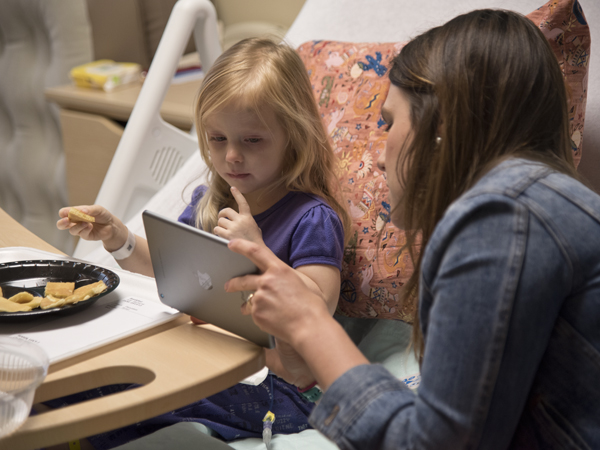
Published in News Stories on August 22, 2016
Lucy Suggs' lessons include making the letter A into an alligator and learning about shapes, which coincided with a plate full of pancakes being delivered to her room.
It's just a normal school day at Batson Children's Hospital, and Lucy, a 3-year-old from Brandon, is learning about squares and triangles as her teacher cut the pancakes. Three sides or four?
Just like in any public school in the state, classes started in August in the Hospital School at the state's only children's hospital. In patient rooms and study areas and sometimes while getting treatments, patients work on lessons to keep learning while they're patients or not ready to return to the classroom.
Lucy's mom, Jeananne Suggs, loves that Lucy isn't missing a bit of preschool education while she's a patient. “I like it a lot,” she said. “Lucy gets to learn her letters and numbers and do an art project, and it's a nice break for me. And she loves the teachers.”

Marion Williams of Magee learns his letters from Hospital School teacher Kristy Gandy.
Just like in any public school in the state, classes started in August at the Hospital School, with the nine teachers reporting in a week beforehand.
“We follow a calendar like any school district,” said Laurie Heiden, Hospital School and Child Life coordinator.
A 30-year part of the state's only children's hospital, the Hospital School begins to serve patients already in special education “from day one” of being an inpatient, said Heiden. “Otherwise, educators become involved at day three, because, by then, we have a better idea of how long the child's stay will be and what the needs are.”
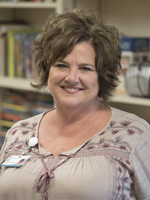
Heiden
Hospital educators work with as many school districts as their students hail from, “keeping them as on-target as possible, so they don't fall behind,” Heiden said.
The Hospital School is somewhat akin to the little red schoolhouse of pioneer days. Children of different ages and abilities study at their own pace.
“I could be teaching a 3-year-old one hour and a 16-year-old the next hour, depending on what the patient census is,” said Holly Easley, a teacher who specializes in the children's rehabilitation area.
“We work together as a team,” said Brielle Youngblood, who began teaching at the Hospital School in December. Her main focus is children ages 3 to young 5-year-olds, “so I might be working with a fifth-grader one hour or an 8-year-old later that day. My job changes from day to day, and I love it.”

Teacher Allyn Self goes over a lesson with Allyson Hewitt of Sumrall while a pink unicorn naps in the foreground.
Software based on what children are learning in their school district is available. “We know the state standards and what they have to be working on,” Heiden said.
For some children, such as those with compromised immune systems, going to school is too risky. “We work with the school district to set up homebound instruction.”
“Some of these kids will miss anywhere from three months to an entire school year,” teacher Allyn Self said. “Often we work as liaisons between families and school districts.”
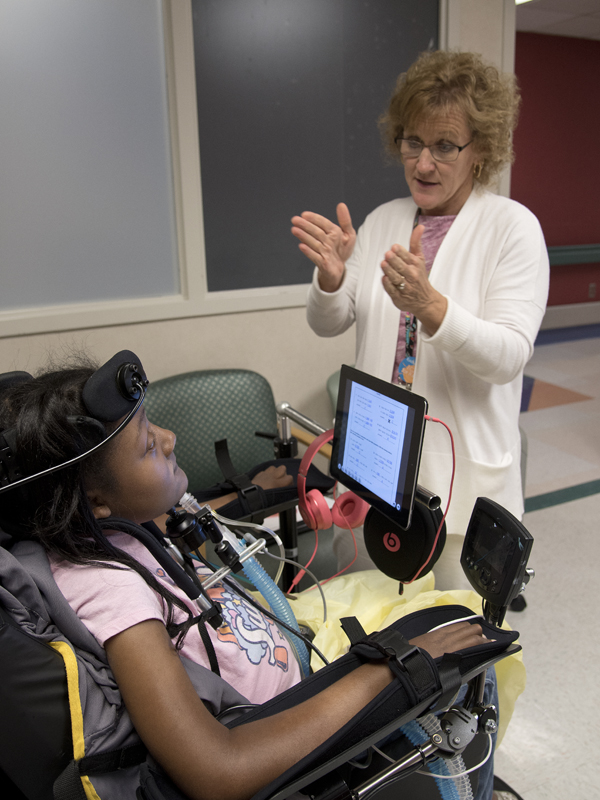
Teacher Kathy Doonan helps DeAsia Scott with a math lesson.
Patients thinking that a hospital stay will somehow get them out of homework are mistaken. Hospital School teachers hand out assignments for plenty of reasons, not the least of which is keeping students current with their grade.
“It's a great distraction,” Self said. “It gets their minds on something else for a while. We try to leave a little homework for them to do on their own when we are confident they understand the assignment and know it won't cause them stress.”
The extra assignments can be a comfort to families as well.
“That's one area where parents, who may feel like they are out of control, can control the situation. They can tell their children to do their school work,” said Heiden. “We try to make it as normal as possible. If we can have one area of normalcy for these children and their families,” said Heiden, “then let education be that one area.”
Hospital educators are often advocates for patients and their families to school districts.

Self works with Colin Henderson of Brandon.
Sometimes hospital educators are documenting that children have been inpatients during dates of school absences or in dialysis or going to doctor visits and writing letters to school districts to get absences excused.
“We are the school for them,” Heiden said, “and we represent them any way we can. We want to make sure our patients get the services they need so they can be successful and pass the school year. That's what we're here for,” Heiden said. “We also work diligently to ensure they have the needed services for when they return home. Whether it is accommodations, modifications, homebound or identification as a child with a disability, we work with the schools to establish their individual needs prior to them going back for a seamless transition.”
Photos
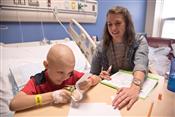 | High Resolution Medium Resolution Low Resolution |
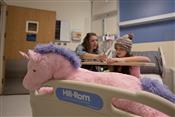 | ADA Dinner 2016 David Felton, D.M.D. Dean of the School of Dentistry and the UMMC Office of Alumni Affairs cordially invite you and your guest to a Dinner during the 2016 American Dental Association Annual Meeting 6:00 - 9:00 p.m. Thursday, October 20, 2016 Ocean Prime 1465 Larime High Resolution Medium Resolution Low Resolution |
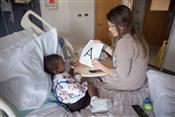 | Dentist Position Available Full Time Dentist opening at ACCESS Family Dental Clinic. AFHSI is a National Health Service Corp loan repayment site. Receive up to $50,000 loan repayment with 2 year commitment, option to serve longer with additional loan repayment. Competitive Salary, Excellent Benefits. FTCA malp High Resolution Medium Resolution Low Resolution |
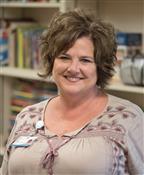 | High Resolution Medium Resolution Low Resolution |
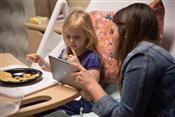 | Hand Hygiene High Resolution Medium Resolution Low Resolution |


